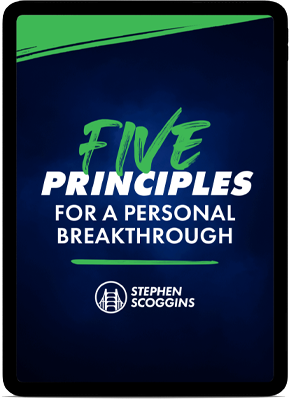
In 2019 in the midst of a booming economy, nearly 70% of Americans had less than one thousand dollars in savings. This tells us a lot. Not only does it prove that most people aren’t financially healthy, but it also proves it’s because they don’t plan for things to go wrong. They think financial success is having money left over after rent and take for granted that everything will go exactly as they expect it to.
Yet if the COVID-19 crisis proves anything, it’s that disasters happen and we need to be better prepared. A crisis is a bad time to discover that you aren’t good with money, and we need to learn from this experience if we want to experience financial security. That’s why I’m going to share 7 principles that my mentor Steve Myrick taught me as a young man. By following these, I’ve been able to prosper consistently, even while most other people are struggling.
1. Focus on Where You Want to Go
Your beliefs are perhaps the most important determinant of your success. There are multiple reasons for this. First of all, this is because beliefs drive your actions and influence how other people treat you. Positive beliefs also keep you encouraged when things get hard, just as negative beliefs will keep you discontented even when things are fine. For these reasons and more, if you believe you will experience success, you probably will.
Successful people focus on what they want to happen, not on whatever is negative in their circumstances right now. So if you want to have financial success, you need to focus on creating lasting wealth. By focusing on specific goals like a 6-month emergency fund and multiple income streams, you’ll start training your brain to desire those things more than bad habits like impulse buying. You’ll also start engaging your imagination to think creatively about ways that you can create more wealth for yourself and your family.
2. Commit to a Five Year Plan
Once you define where you want to go, you need to make a plan to get there. Not only will this make your focus that much stronger, but it will also create self accountability.
So why 5 years? Why not 3? It’s a great question. My opinion is that 5 years will give you enough time to achieve the most ambitious goals you have right now. Projecting further than 5 years is likely pointless, since human beings aren’t that good at predicting the future. Likewise, less time may keep you from thinking as big as you could.
3. If You Fail to Plan, You Plan to Fail
That’s why you need a budget. With a budget, you can tell your money where to go. There’s a lot more to say about budgeting than we have space for in this post, but here’s a breakdown of the basics you can start shooting for right now. The percentages are based off of your after-tax income:
- Housing/Rent – No More Than 13%
- Utilities – No More Than 10%
- Food – No More Than 15%
- Transportation – No More Than 10%
- Insurance – Not More Than 15%
- Paying of Debt or Discretionary – Not More Than 15%
- Giving – No Less Than 10%
- Saving – No Less Than 12%
4. Only Action Leads to Traction
Budgets are great, but they only work if you stick to them. Sooner or later, you have to firmly decide that your budget is your law. People who do this experience financial success.
One way to ensure budget discipline is to establish firm routines. For example, if payday is on the 1st, you should automate as much of the disbursement as possible to take place on the 1st. Have all of the money you’ve delegated in your budget immediately end up in your spending account, and have the rest go to your savings and investment accounts. This is how I do it. By the time I see my net income, the money has already been moved. This helps prevent impulse buying and keeps me on track.
5. Get Out of Debt, And Stay Out
As a general rule, if you don’t have the cash to pay for something, you shouldn’t buy it. With debt, you pay extra in interest. Not only that, but you set yourself up for bankruptcy if you can’t end up paying it off. Paying with cash makes your life easier and saves you money in the long run.
To use an example, let’s take a $30,000 car. Let’s say you enter into a loan to buy the car at 5% interest over 5 years. In this scenario, you will end up paying $4,500 in interest over the following 5 years. In contrast, imagine if you saved up for the same car and paid for it in cash. When you consider a 10% discount on the cost of the car paying for it with cash down, you’ll save an additional $3,000. This totals $7,500 saved!
And it gets better. Imagine if you invested that $3,000 you saved in year 1 in a fund that generated 10% interest every year. That would earn you an additional $1,832! Now we’re at a $9,332 swing in cash flow from the decision to pay cash down! Hopefully this illustrates the benefits of avoiding debt and staying with cash.
6. Measure Your Milestones Monthly
What you don’t measure won’t change. I recommend checking your progress every time you get paid.
7. Make Adjustments Until it All Works
As you pursue financial success and track your progress, gaps and weaknesses will appear. These will reveal the new habits you need to form and the types of help you may need. It could be that you need a mentor or coach to guide you in managing your finances. You may also need an additional part time job to make extra money.
Financial Success is Possible for Anyone
You can experience lasting financial health. It just requires grit, discipline, and accountability. To get more help with managing your life and achieving success, check out more free resources from The Journey Principles. We exist to help you go from stuck to unstoppable in every area of your life, and that includes finances.



